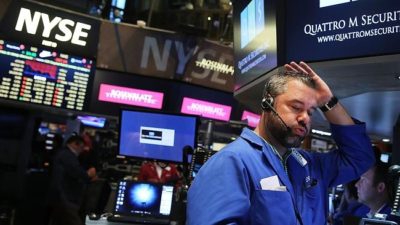The entire world could be on the verge of a massive economic meltdown, with China helping lead the way.
The Dow Jones tumbled more than 500 points Friday and set an all-time mid-day record Monday with a fall of 1,089 points.
Obviously, this meltdown will not be like the last one, simply because the underlying causes will be different. But we could be on the verge of the worst economic fall since the Great Depression of the 1930s.
Here are four reasons why you should be concerned:
1. The world is reeling. Recent stock market losses around the world are similar to those in 1929 and 2007. Britain’s main stock index, the FTSE 100, lost $94.49 billion or 4.5 percent of its value on Monday, The Guardian reported. Germany’s DAX has lost 20 percent of its value since April, making it a Bear market. The Guardian compared the situation to 2007. The main Chinese stock market, the Shanghai Composite, lost 9 percent of its value on Monday, causing the official Beijing News agency to call the event “Black Monday.” In stock market slang “black” is used to describe the day of a market crash. In fact, the Shanghai Composite has lost 40 percent the last 10 weeks. The Great Depression in the United States began with a stock market crash on Black Thursday, October 24, 1929.
2. The real estate bubble is back. Real estate bubbles that could be as bad those in 2007 are developing around the world. In June 2015 the average housing price in the United States was approaching the all-time high reached in July 2006, at the height of the Great Housing Bubble, according to the National Association of Realtors. Nobel Prize winning economist Vernon Smith thinks Australia is in the middle of a housing bubble similar to the subprime mortgage crisis in the United States, according to the Australian Broadcasting Corporation.
New book reveals gold-buying secrets that dealers don’t want you to know about…
China is in the midst of a housing bubble that could create even more havoc than the stock market meltdown, according to investor Charles Hugh Smith. There are local real estate bubbles in some American cities, including Denver, San Francisco, San Jose, Los Angeles, New York City, Dallas-Fort Worth, Chicago and Washington that are reminiscent of the Great Housing Bubble.
3. The price of oil is plummeting. The price of oil fell to $42.62 a barrel last week, the lowest price in six years. Many experts say that while that’s good news for gas prices, it’s bad news for the overall health of the economy. A Wall Street Journal article indicates this could be the beginning of an across-the-board collapse in commodity prices triggered by the Chinese downturn. That could lead to lower farm prices in America’s heartland. One result will be the end of the oil boom and the economic recovery in the Great Plains. No commodity is safe, not even gold. Gold was trading at prices lower than it was in 2010.
4. American incomes are stagnant. Most people in the US have not experienced an economic recovery. In fact, the data indicates that average incomes have not increased in decades. Pew Research discovered that the average real wage in the United States in 2014 was only slightly higher than it was in 1964 (when Lyndon Johnson was in the White House and Goldfinger was playing at your neighborhood movie house). Adjusted for inflation, the average American made $19.18 an hour in 1964 and $20.67 an hour in 2014. If that was not bad enough, The Washington Post reported that the average household income in 81 percent of the counties in the United States was lower in 2013 than it was in 1999.
What do you think? Is the American economy in further trouble? Share your thoughts in the section below:
 Off The Grid News Better Ideas For Off The Grid Living
Off The Grid News Better Ideas For Off The Grid Living



